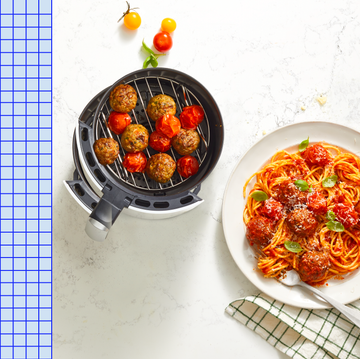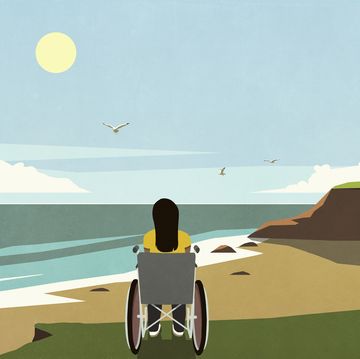It may sound like a made-up word, but “inflammaging” is a medical term coined more than 20 years ago to describe the chronic inflammation that happens in our bodies as we get older. “It’s a word that combines ‘aging’ and ‘inflammation’ to describe a low-level inflammatory process,” says Linda Herrmann, Ph.D., a clinical associate professor and aging expert in the Division of Advanced Nursing Practice at Rutgers, the State University of New Jersey. “It’s systemic throughout the body, but occurs in the absence of an acute illness or injury.”
The concept has been a hot research topic for the past two decades. “We’re looking for what leads to age-related changes in the body. The question is how and why do we age, and is there anything we can do about it?” says Ian Neel, M.D., an associate clinical professor of medicine and member of the UC San Diego, Division of Geriatrics, Gerontology, and Palliative Care team. “We know that people with multiple medical problems have higher blood markers for inflammation, and that higher inflammation levels tends to be correlated to higher disease levels.”
It turns out that inflammaging is a risk factor for cardiovascular diseases, kidney disease, diabetes, cancer, depression and dementia. “The rise in rates of these conditions are the by-products of a longer life span,” says Nicole Ehrhart, V.M.D., the director of Colorado State University’s Columbine Health Systems Center for Healthy Aging, which coordinates the university’s interdisciplinary research teams focused on aging. “But health span, or the number of years we spend living without the burden of chronic disease, has not kept pace.”
Researchers hope to pinpoint key factors that affect our biological ages rather than our chronological ages. “Aging is the highest risk factor for disease on the rise globally,” says Ehrhart. “Our aging cells don’t recover and repair from the wear and tear of everyday function or damage later in life. If aging is the common thread linking all chronic disease of older age, perhaps we could think of cellular aging as a ‘disease’ that we could ‘treat.’” Until we have concrete answers on how to stop inflammaging completely, consider this your guide to slowing it down.
What causes inflammaging?
Aging is a complex process, and research about inflammaging is still in its early stages. “There are many theories being explored about the causes of inflammaging, but we don’t have certainty about it yet,” says Herrmann. Potential triggers may include genetic susceptibility, obesity, changes in the microbiome and chronic infections.
Another cause seems to be cellular senescence, which is when cells stop replicating, but they don’t die. “Instead, they go into a sort of ‘undead’ state, secreting inflammatory factors and inducing neighbor cells to do the same,” says Ehrhart. These cells can accumulate as we age, causing the immune system not to function as efficiently as we get older.
How is inflammation different from inflammaging?
Of course, not all inflammation is bad, and your body’s ability to launch an acute inflammatory response to invaders is essential. “We need inflammation to help our bodies fight off infections caused by viruses or bacteria or to help an injury, such as a cut, heal,” says Neel.
However, “as we age, our immune system gets less specific to what it’s reacting to. After a while, this cumulative sort of chronic response actually becomes this low-grade chronic inflammation,” says Ehrhart. “It doesn’t’ function like it used to when we were younger.” The result is inflammaging.
How can you prevent inflammaging?
Aging is inevitable, but you can take these steps to manage inflammaging:
- Get moving. Exercise provides the greatest impact for keeping you healthy and reducing the risk of chronic conditions, like heart disease or dementia, says Neel. In fact, a recent study found that when older adults maintained regular exercise throughout their lives, they were more likely to prevent or delay inflammaging.
- Work on your balance. “We lose sensitivity in our feet and a sense of where our foot is as we age, which can contribute to falls and increase the risk of head and body injuries,” says Neel. Doing activities such as tai chi and yoga once a week can help.
- Eat right. A diet that includes foods rich in omega-3 fatty acids (such as salmon) and antioxidants (such as berries) may help manage inflammaging, says Neel. Studies have found that eating a Mediterranean diet, which is high in vegetables, legumes, fruits, nuts and seeds, may be linked to lower levels of inflammation.
- Focus on your waistline. Fat that accumulates around the waistline, known as visceral fat, contains inflammatory markers, so reducing the circumference of your midsection may help, says Herrmann.
- Manage stress. Chronic stress or depression may ramp up inflammation, so it's important to look for ways to decompress.
- Spend quality time with others. Some research shows that loneliness also may contribute to inflammation.
- Get good sleep. Poor sleep is associated with higher levels of inflammatory biomarkers.
Arricca Elin SanSone has written about health and lifestyle topics for Prevention, Country Living, Woman's Day, and more. She’s passionate about gardening, baking, reading, and spending time with the people and dogs she loves.












